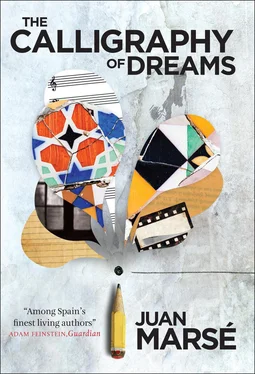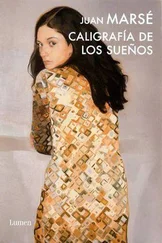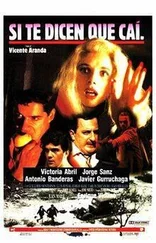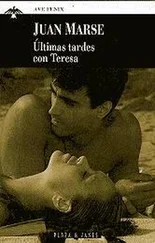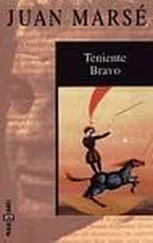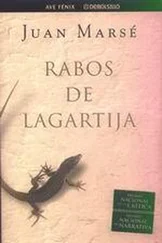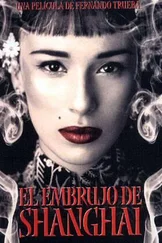He sits at his table and rubs the misted-up window with his hand. At the next table, Señor Agustín is eating a wild asparagus tortilla, playing draughts with one of the customers. While he is drying the rain off his scarf, Señora Paquita comes out of the kitchen carrying a bowl of Russian salad. She stops beside him: So who’s this dreamy Romeo who stands out in the rain staring like a dummy at a girl? Yours truly here, Señora Paquita. You’ve got wet ears and you’re tired out, you ought to go home and change your clothes. He listens to her, half asleep. I’m fine, Señora Paquita. I saw you standing out there like a booby. Were you expecting Violeta to come out on to the balcony, or did you want to catch pneumonia? That’s it, I wanted to catch pneumonia, Señora Paqui. Your mother must be waiting for you to have supper. My mother is working night shifts until the end of the month, there’s nobody at home waiting for me. She turns her back on him and goes to leave the Russian salad on her brother’s table. Then she returns, hands on hips, you’ll have a glass of hot milk, won’t you? I don’t want milk, thank you. Then a cup of cocoa. I’d prefer a double brandy, Señora Paquita, so that I can get drunk more quickly. Hey, don’t you try to be funny with me! What a disaster you are, just look at the state of you, look at your scarf, and your shoes. He replies, in a weak, dull voice, I’m fine, Señora Paqui, but she is already behind the bar, where she opens a cocoa drink, pours out a glass, heats it in the steam from the coffee machine, adds a tot of brandy, and comes back over.
“I’ve cheered it up a little.” She leaves the glass on the table. “Drink it down and get straight off home,” she orders, before returning to the kitchen.
He drinks it sleepily and thinks things over. Who kind of idiot dances with a sack of potatoes simply because her mother asks him to do her a favour? Your servant here, the dummy’s dummy. Every so often he rubs the steamed-up window with his hand, keeping an eye on Señora Mir’s doorway. The rain has eased off to a drizzle. At last, around half past nine, he sees her toiling up the middle of the street, carefully stepping between fleeting glints of light and reflections as sharp as broken glass on the wet asphalt. She is hunched over, staggering on her high heels, her wet skirt stuck to her sturdy thighs, covering her head with the jacket, its fur collar flattened by the rain and beaded with droplets of light as she passes beneath the streetlamp, as if it were sheltering fireflies. When she reaches her doorway she halts and seems to hesitate. She looks from side to side and stands motionless for some time, head down. She looks like a huge, ugly paper bird, deflated and streaming with water. Her chin on her chest, she takes one step forward and two back, shakes her jacket and then stands still again. When at last she decides to go in, Ringo closes his book, gets up from the table, and goes over to the bar kitchen to announce, loudly and firmly:
“I’m going, Señora Paqui. Thanks, and goodnight.”
“Bye, you ninny.”
Señor Carmona says he found her lying on the second-floor landing in her wet clothes, head resting on the step closest to her front door. This was at dawn, and there wasn’t much light, so I stumbled over her and nearly fell down the stairs, he explained in the tavern. It was horrible seeing her like stretched out like that, I thought she was dead. She had taken her shoes off, there were holes in the knees of her stockings, and her face was white as a sheet apart from a few smears of make-up. Señor Carmona works as a stevedore down at the docks, and leaves home very early each morning. He says he rang the bell until he woke Violeta, who was startled, then angry with her mother. Between the two of them they tried to rouse her and get her into the flat.
So, Ringo deduces, she didn’t ring the bell, she spent the night out on the landing. She must have been drunk and unable to find the doorbell, or perhaps she felt so ashamed of herself she didn’t want Violeta to see her in such a state; or perhaps she did ring, but her daughter was already asleep and didn’t hear. Why didn’t she stay awake to wait for her, knowing she didn’t have the key? Ringo doesn’t want to ask himself any more questions, he prefers to think about something else or to doze over his music scores and his book. The clandestine job he has at night in the coffee-roasting shed makes him drowsy every morning as he kills time in the Rosales bar.
A fortnight later he learns that Señora Mir’s night-time wandering is just the first of a litany of shocks for Violeta, the first in a series of madcap escapades outside the neighbourhood. At the same time, her mother’s lack of care for her appearance and for the flat, her desire to be left alone and her helplessness, as well as the neglect of her clients that set in some weeks earlier, now seems to have become an irreversible decline. One sunny Sunday morning in February, she left her home early in the morning, and did not come back for lunch. That afternoon, after searching for her in several local taverns, and even in the bar at the Salón Cibeles and La Lealtad, Violeta heard from Rufina the hairdresser that she had been seen in mid-morning wandering like a sleepwalker up the highway to El Carmelo. Night was falling by the time her daughter found her on the eastern slope of Montaña Pelada, sitting on the three steps of the unfinished stairway cut into the rock. Hugging her basket of dried lavender to her chest, she was gazing intently at black smoke curling upwards into the sky from the miserable roofs of the shacks of El Carmelo. She refused to stand up, but seemed lucid and calm, explaining that she’d climbed up there to pick elderflowers.
“She’s promised me she won’t escape again, Señora Paqui,” says Violeta as she drinks a milky coffee at the counter in the Rosales bar. “She’s in bed now. Grandma Aurora is coming to visit her this afternoon or tomorrow … I don’t think she’ll get up, but if you or Señor Agustín see her coming out of the building, please let me know at the hospital.” She glances over at Ringo, as if including him in her request.
To come across Violeta in the bar, and see her talking in a friendly way with Señora Paquita, is a novelty for him. She is wearing a white turtleneck jumper and a coat that is too short for her. Her hair is done up in a bun, her shoes and stockings are white, and she is carrying a new nurse’s uniform over her arm. Señora Paquita listens with a worried look on her face. She sees the poor girl’s life as an endless succession of calamities: her only family are her mother and father and her paternal grandmother — who has not wanted anything to do with her son Ramón for many years now — and she is bound to feel very lonely.
Ringo on the other hand does not know what to think. He is hypnotised yet again by the sight of Violeta. He stares and stares at her, but cannot recognise the girl who only a fortnight earlier had let him lift her skirt and caress her buttocks beneath a bougainvillea dripping with rain. Crouching behind his book, shielded yet again from a fickle, ungraspable reality, he thinks her profile is suddenly that of an adult, as if her new job and all the worries of the past few days had accelerated the transition from adolescence to womanhood. With a vague sense of loss, his eyes travel down to her legs in their white stockings. He surveys her placid, mature calves calmly pressed together, and wonders why the scent of her wet hair should linger more stubbornly in his memory than anything else, and why that scent is even sharper than desire, why now as she talks briefly to Señora Paquita in a low voice, struggling to overcome a hostility that is even more pointed than usual, listening to her words of advice with her head tilted towards her good ear, why all of a sudden this girl seems older than her eighteen years. She has scarcely paid him any attention: he looks like a shadow against the wall tiles, simply one of many in the gloomy tavern, so ever-present and familiar it is like a state of mind.
Читать дальше
